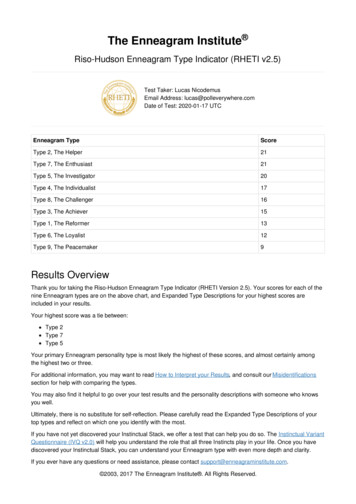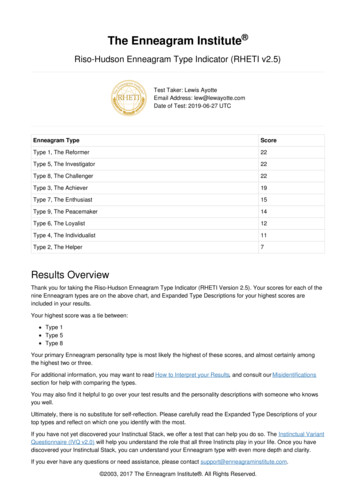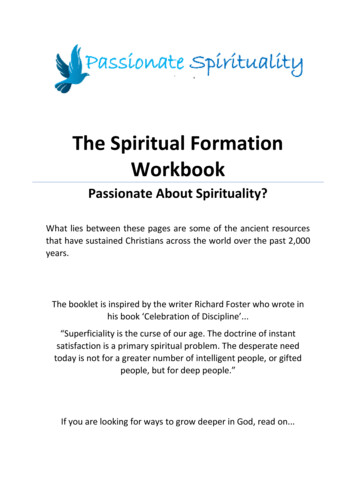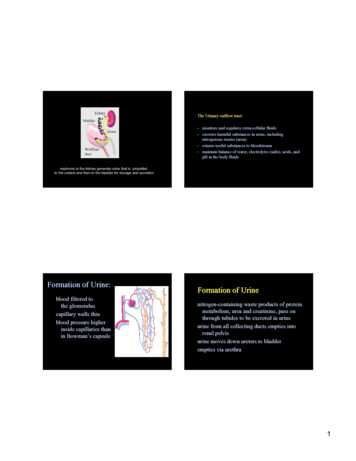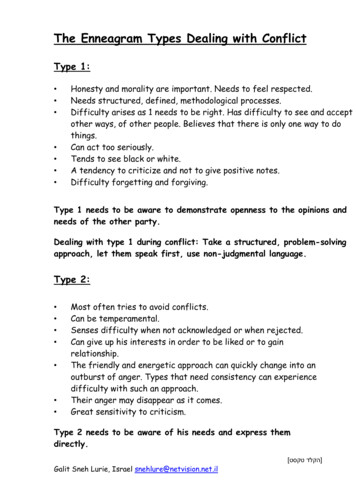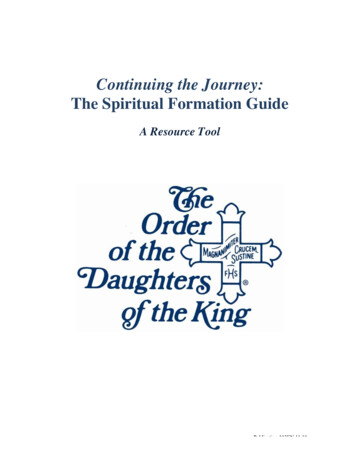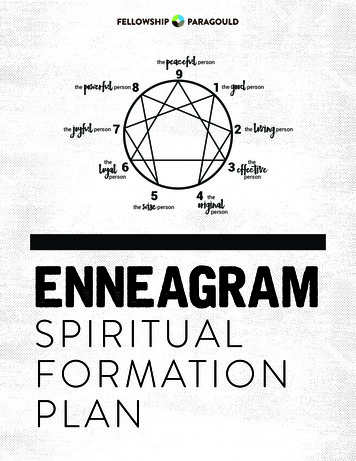
Transcription
thethethePEACEFUL personPOWERFUL person 891 the GOOD personJOYFUL person 72 the LOVING personthethe6LOYALperson3 EFFECTIVEpersonthe5WISE person4theORIGINALpersonENNEAGRAMS P IR I TUA LFO R MATIO NPL AN
H O W D O W E A P P LY T H E G O S P E L T O O U R H E A R T SI N S U C H A WAY T H AT W E B E C O M E E M O T I O N A L LYHEALTHY AND ARE ABLE TO ENJOY DEEPREL ATIONSHIPS WITH GOD AND OTHERS?As Christians, it’s easy for us to drift into a surface-level spiritual life that hinders our relationships with God and others. Weoften live lives marked by busyness, overcommitment, overworking, and a lack of self-care. On the outside we might be seen assomeone who is passionate about Jesus and making disciples, but beneath the surface we often find an anxious soul that strugglesto say no, a soul that is easily controlled by other people’s opinions, a defensive soul that strives to cover up its weaknesses andthat doesn’t know what to do with all its anger, sadness, and fear. Ultimately we find a soul that doesn’t know how to be vulnerableand trust God and others fully.Paul’s prayer in Ephesians 3:14-19 teaches us that if we were created to know the love of Christ intimately the love of Christand be filled with all the fullness of God (i.e., to grow & mature to the image of Jesus), then we must be willing to go beneath thesurface and be “strengthened with power through [the] Spirit in [our] inner being.” According to Paul, we desperately need thegospel to make its way from our heads to our hearts—into the core of our inner being—to the places that remain untouched andunaffected by Jesus, to the places where we need to be healed and transformed.How do we drive the gospel beneath the surface so we can enjoy a first-hand experience of Christ’s love and grow into the menand women God made us to be?At Fellowship Paragould, we have found the Enneagram to be one of the most effective vehicles for driving the gospel into thedeep places in my heart. To be clear, there is no power in the Enneagram. The Enneagram is just a tool. All the power for salvationand transformation lies in the gospel of Jesus Christ (Rom. 1:16; 16:25). The Enneagram is helpful because it has the ability toserve the gospel. The Enneagram is a vehicle the Holy Spirit can use to drive the gospel in the unchartered terrains of our souls sothat we can be strengthened with power in our inner being to know and grow in the love of Jesus. We use the Enneagram in ourchurch as one of the primary tools for the spiritual formation of our people.What Is the Enneagram?Unlike other personality tests that measure how you do tasks, the Enneagram is an ancient tool that describes your personalityin terms of who you are and how you relate to God, to others, and to yourself.According to the Enneagram there are nine personality types. Each personality has particular gifts and weaknesses they bringinto their relationships. In addition, each has a besetting sin and a core underlying emotion they are trying to overcome: either
guilt, fear, or shame (Gen. 3:7-13).In essence, the Enneagram is trying to introduce you to your false self, the unique ways you bear the effects of the fall and yourtrue self, and the unique ways you bear God’s image in your relationships. The true self is the person God made us to be, whotrusts and knows that at the core of our being that we are deeply loved by God. The false self is an image we create, a mask wewear in self-defense to help us feel safe, loved, and accepted apart from trusting in the love of Christ for our identity.In this way, the design of the Enneagram helps you take off the mask, so the real you can meet the real Jesus and be transformedinto the person God made you to be, for His glory and the good of others.The Enneagram resonates with most people as it aids our understanding of how we’ve been shaped by our stories. No matter howgodly and wonderful your parents may have been, in a fallen world nobody comes out of childhood unscathed. The Enneagramhelps us identify the childhood wounds we carry and the defensive strategies we developed to compensate for those wounds, sothat we can bring those to Jesus and begin to heal and re-learn to trust Him completely.The Enneagram Spiritual Formation PlanTo make the Enneagram accessible in our church we held a two-day Enneagram workshop and developed a personal spiritualformation plan for each of the nine personalities. The plan includes a brief introduction to your personality, your strengths andweaknesses, the lies you tend to believe and the truth you need to hear, specific spiritual disciplines, a key Bible memory verseand a tailored gospel expression for your personality.We work through these plans together in our missional communities and DNA groups to help us be more fluent in speaking thegospel to each other’s hearts, so that we can grow up in every way into Christ and be healthy disciples who are making healthydisciples (Eph. 4:15).Using This Tool1.Take an enneagram test. The Wagner Enneagram Personality Style Scales (WEPSS) is our favorite. It costs ten dollars,but it’s worth it!2.Match your results with your specific personality spiritual formation plan.3.Discuss with your community or DNA group. What resonates? What doesn’t seem like a good fit? How do you seeevidence of the sin you are prone to seek, and how do you need others to remind you of the gospel?4.Regularly refer to and revisit these plans as you walk through missional community life together. Many disciplescontinually revisit their personal plan throughout the year.We made our Enneagram spiritual formation plan available on Saturate because it’s formed and shaped our people. We pray theHoly Spirit uses this resource to help you and your people go beneath the surface so your hearts may be strengthened by thegospel of Jesus Christ, for the sake of your relationships with God, others, and yourself.
1T Y P ETHE GOODPERSONO N EOnes are attracted to and value goodness. They believe life isFOUR WORDSPerfectionist, Idealist,Principled, CriticalBESETTING SINAngerUNDERLYING EMOTIONGuiltSURVIVAL STRATEGY:I must be perfect and good.BIBLE MEMORY VERSE“but God shows his love for us in thatwhile we were still sinners, Christ diedfor us.” Romans 5:8FAMOUS ONESthe Apostle Paul, St. Augustine,Martin Luther, John Calvin, HarryTruman, Tom Brokaw, Ted Koppel,Brian Williams, Anderson Cooper,Hilary Clinton, Harrison Fordabout doing your best, setting high standards and goals and livingup to them. Many Ones report growing up in families with highstandards and the pressure to perform, often being criticized fortheir mistakes. As a result, they developed a fear of failure andan incessant need to be perfect and good enough, unconsciouslyseeking to earn the love and acceptance of their caregivers. Theybecome “model children who are motivated to ‘be good,’ ‘tryharder’ and ‘get it right.’” 1 As adults, Ones are sometimes describedas obsessive compulsive, always trying to perfect and make thingsbetter. There is always room for improvement for Ones. They arecritical toward others’ mistakes and especially critical toward theirown. Their drive for perfection often leads them to reform whatis broken and can be a blessing. However, it can also be a burden,leading to a deep sense of anger and guilt.WEAKNESSES: For a One, the besetting sin is anger, and theunderlying emotion Ones are trying to conquer is guilt. Ones oftencarry a suppressed anger because nothing is ever good enough—including and especially themselves. This anger is driven by anexaggerated sense of guilt and a feeling of not measuring up, whichleads Ones to be very hard on themselves. “Few casual observerswould suspect how much [Ones] are suffering from the attacksof their Inner Critic.”2 This is not only how Ones tend to relateto themselves, but to God and others, through performance andcriticism.
STRENGTHS: God has given Ones particular gifts that uniquely express His image to the world. When emotionallyand spiritually healthy, Ones live with conviction, are bold and courageous, are willing to take a stand and sacrificethemselves for what’s right, and keep the mission of God moving forward; they are sensible, responsible, ethical, selfdisciplined, just, fair, tolerant of failure—both theirs and others—and accepting of their limits and losses.3 HealthyOnes are grace-driven, not guilt-driven.The lies Ones believe: “It’s not ok to make a mistake.” 4 “I have to be perfect.”The truth Ones need: “You are loved for who you are, not how good you are.”SPECIFIC PRACTICES FOR SPIRITUAL FORMATIONThe tendency of a One is to carry feelings of anger and guilt over the fear of not being good enough. The Spiritof Christ wants to transform the fruit of anger and guilt into love, patience, and grace (Gal. 5:22-23). Spiritualdisciplines should be selected with this trajectory in mind. Downstream practices are those that come naturally forthis type. Upstream practices are those that are more challenging for this type because they confront the false selfor flesh. 5DOWNSTREAM PRACTICES Meditating on God’s Word: God’s Word is that standard of truth and goodness. Delighting in God’s Wordand “meditating on His law day and night” (Ps. 1:2) enliven the Ones intrinsic appreciation for goodnessand reorients him around the perfection of God. Making things better: Ones feel useful when they are able to speak into things, reform things, andmake things better. The key to becoming healthy for a One is being motivated by a love for God’s glory,performing from God’s approval instead of for His approval, and by a love for others that sacrifices self fortheir good.UPSTREAM PRACTICES Journaling Confession & Assurance: “To articulate imperfection is difficult [for a One], but to record it onpaper can be emotionally painful When one writes out the cries of the heart it can feel more official and truerthan if it remains in the head.” 4 Writing out one’s confession solidifies his imperfections and sinfulness. TheOne can rest assured that he is doing good by confessing his sin, trusting that this kind of innerconfrontation will serve as a channel to the gracious and loving presence of Christ (Heb. 4:14-16).After confession, the One must move to professing his assurance of pardon found in the sacrifice andT Y P EO N E: :T H EG O O DP E R S O N1
resurrection of Jesus. Ones need to write out the truth that while they are still sinners, God loves them,and he demonstrated His love on the cross (Rom. 5:8). Nature Walks: A walk through nature can be a calming and emotionally healing discipline for Ones, quieting theirinner anger and reorienting them around the goodness and beauty of God. It invites Ones to slow down and reconnectwith God and provides space for their inner critic to be crucified with Christ (Gal. 2:20).KEY BIBLE MEMORY VERSEThe key verse that Ones must commit to memory is Romans 5:8, “God shows his love for us in that while we were still sinners,Christ died for us.”THE GOSPELONES NEED TO BELIEVEThis verse tells me that God knows all my sin andimperfections and still loves me. In Christ, I amtruly known and fully loved. I am loved for who I am,not because of how good I am, but solely because ofJesus. Jesus was good in my place. All of my imperfectionswere put on Jesus, the Perfect One, who loved me andgave Himself up for me. He walked out of the grave toreform and perfect every part of creation and every partof me in due time. Through His Spirit I now have hisrighteousness credited to me. This means God doesn’tsee me and love me just as I am; even better, God seesme and loves me just as Jesus is—righteous.1 Sherrill, 26.2 Riso & Hudson, Discovering Your Personality Type, 91.3 Ibid., 88.4 Sherrill, 26.5 The language of upstream and downstream comes from Sherrill, chapter 5, Enneagram & the Way of Jesus.6 Ibid., 92.7 Riso & Hudson, 78.T Y P EO N E: :T H EG O O DP E R S O N1
T YPE ONE :: LEVELS OF DEVELOPMENTThe Levels of Development are measuring our capacity to be fully present in our relationships and use our personality andgifts in life-giving ways. 7HEALTHY LEVELS Level 1 (at their best): Become extraordinarily wise and discerning. By accepting what is, they becometranscendentally realistic, knowing the best action to take in each moment. Humane, inspiring, and hopeful; the truthwill be heard. Level 2: Conscientious with strong personal convictions, they have an intense sense of right and wrong, personalreligious and moral values. Wish to be rational, reasonable, self-disciplined, mature, moderate in all things. Level 3: Extremely principled, always want to be fair, objective, and ethical: truth and justice primary values. Sense ofresponsibility, personal integrity, and of having a higher purpose often make them teachers and witnesses to the truth.AVERAGE LEVELS Level 4: Dissatisfied with reality, they become high-minded idealists, feeling that it is up to them to improveeverything: crusaders, advocates, critics. Into “causes” and explaining to others how things “ought” to be. Level 5: Afraid of making a mistake, everything must be consistent with their ideals. Become orderly and wellorganized, but impersonal, puritanical, emotionally constricted, rigidly keeping their feelings and impulses in check.Often workaholics—”anal-compulsive,” punctual, pedantic, and fastidious. Level 6: Highly critical both of self and others: picky, judgmental, perfectionistic. Very opinionated about everything:correcting people and badgering them to “do the right thing”—as they see it. Impatient, never satisfied with anythingunless it is done according to their prescriptions. Moralizing, scolding, abrasive, and indignantly angry.UNHEALTHY LEVELS Level 7: Can be highly dogmatic, self-righteous, intolerant, and inflexible. Begin dealing in absolutes; they alone know“The Truth.” Everyone else is wrong; very severe in judgments, while rationalizing own actions. Level 8: Become obsessive about imperfection and the wrongdoing of others, although they may fall intocontradictory actions, hypocritically doing the opposite of what they preach. Level 9: Become condemnatory toward others, punitive and cruel to rid themselves of wrongdoers. Severedepressions, nervous breakdowns, and suicide attempts are likely. Generally corresponds to the Obsessive-Compulsiveand Depressive personality disorders.7 Riso & Hudson, 78.T Y P EO N E: :T H EG O O DP E R S O N1
2T Y P ET W OTHELOVINGPERSONTwos see the world in terms of loving and serving people. Life isFOUR WORDSRelational, Generous,Insecure, Self-UnawareBESETTING SINPrideUNDERLYING EMOTIONShameSURVIVAL STRATEGY:I must be helping and caring.BIBLE MEMORY VERSEPeter said to him, “You shall never washmy feet.” Jesus answered him, “If I donot wash you, you have no share withme.” John 13:8FAMOUS TwosBarnabas, Mother Teresa,Elvis Presley, Madonna, Dolly Parton,Danny Glover, Bill Cosby, Mr. Rogersabout being generous and meeting the needs of others. It’s possiblethat Twos grew up in an environment where they had to step up ata young age and learn how to take care of themselves and othersemotionally and/or physically. They may have had to provideemotional support from their parents and siblings, sometimesbecoming the parent in the family. This means that Twos had to“grow up fast.” As a result, Twos cultivated a gift for empathy andmoving toward others in love and service. However, the dark side ofTwos is a desperate “need to be needed.” This is the essence of theirinner battle with shame and pride.WEAKNESSES: They underlying emotion Twos are battling isshame and a sense of worthlessness if they aren’t needed by others.“Who am I if I’m not helping others?” is the cry of the soul for a Two.Ironically, this leads to a form of pride that unconsciously motivatesTwos in the sense that their service of others can be motivatedby their own self-interest and need for approval. This can lead topeople-pleasing, over-attachment to people, and the fear of man.Unhealthy Twos also deny their own needs. They are energized bymeeting others’ needs but fear having the tables turned since itcompromises their survival strategy of being the caregiver.STRENGTHS: Twos uniquely express the image of God. Jesussaid, “The Son of Man didn’t come to be served, but to serve” (Mark10:45)—that’s a Two. When they are emotionally and spiritually
healthy, Twos are humble, thoughtful, caring, empathetic, appreciative, generous, affectionate, encouraging,compassionate, self-sacrificing, others-oriented,8 but are also willing to let their own feet be washed (John 13:8). Inother words, healthy Twos are in touch with their own emotional and spiritual needs and are willing to be vulnerablebefore God and others.The lies Twos believe: “It’s not ok to be needy.”9The truth Twos need: “You are needy, and that’s ok.”SPECIFIC PRACTICES FOR SPIRITUAL FORMATIONTwos are tempted towards pride, serving others with self-serving motivations. The underlying emotion driving Twos isshame at the possibility of being viewed as needy and unlovable. The Spirit of Christ wants to transform the fruit ofpride and shame into love and humility (Gal. 5:22-23). Spiritual disciplines should be selected with this trajectory inmind. Downstream practices are those that come naturally for this type. Upstream practices are those that are morechallenging for this type because they confront the false self or flesh. 10DOWNSTREAM PRACTICES Hospitality & Service: 11 Twos feel most alive when they make space and seize opportunities to extend thewelcome and service of Christ to others. They love to bless and serve. This gift comes naturally to them.Acts of hospitality and service such as opening their homes, entertaining guests, hosting dinners, exercisinggenerosity, offering words of encouragement, and serving in the church should be regular rhythms forTwos. The key, obviously, is to do this without expecting anything in return. Spiritual Friendship: Twos tend to be energized by deep friendship and sharing life with others. Jesus saidin John 15:13, “Greater love has no one than this, that someone lay down his life for his friends.” This is theessence of true friendship—intentional, self-giving love that is built on deep trust. Twos enjoy the mutualand natural supply of support, encouragement, counsel, fun, growth, and value that goes with friendship.Spiritual friendship communicates the unique type of affection, vulnerability, and trust between friendsproduced by the Holy Spirit through faith in the gospel. Twos must create space in their lives to foster deepspiritual friendship with one or a few people, with whom they can be known and loved.UPSTREAM PRACTICES Centering Prayer: This is a form of prayer that invites us to slow down and be still before God without theneed to be doing something. It brings us into the posture of Mary who was sitting still and fully presentT Y P ET W O: :T H EL O V I N GP E R S O N2
with Jesus instead of Martha who was distracted with serving Jesus (Luke 10:38-42). A great way to do this isby focusing on your breathing. With each breath inhaled and exhaled, acknowledge that God is present with you,loving you and delighting in you. This practices helps Twos embrace their own neediness, which is wrapped inGod’s sufficient love. Fasting: This discipline of fasting is good for Twos because it helps ground them in the reality of God and helpsthem live consciously aware of His presence. Awakening their inner hunger for God is a way of reinforcing thatGod is enough and that He is faithful to have met their deepest need in Christ.KEY BIBLE MEMORY VERSEThe Scripture Twos should memorize is John 13:8. Jesus says to Peter, “Unless I wash you, you have no part in me.” Twos aremore comfortable doing the washing. Pride will cause them to want to resist being served by others. But Jesus solemnly warnsPeter that if he doesn’t humble himself and admit his weakness and neediness, then he cannot have a relationship with Jesus.For Jesus came to serve, not to be served. Twos must allow themselves to be served by Jesus and others, in order to experiencethe love they long for.THE GOSPELTWOS NEED TO BELIEVEBecause Jesus’s grace is sufficient, I am free to assumethe posture of a child, admit my neediness, and walk inhumility (2 Cor. 12:9). His grace is sufficient for me,so I don’t have to feel shame related to my needs andweakness. And in Christ I have a High Priest who isable to sympathize with me, since Jesus became man(Heb. 4:15). In essence, Jesus became needy so that Ican be needy with Him, without the feeling of shame.The incarnation and the cross tell me how much Hewants me.8 Rison & Hudson, 979 Adapted from Sherrill, 28.10 The language of upstream and downstream comes from Sherrill, chapter 5, Enneagram & the Way of Jesus.11 Sherrill, 94.T Y P ET W O: :T H EL O V I N GP E R S O N2
T YPE TWO :: LEVELS OF DEVELOPMENTThe Levels of Development are measuring our capacity to be fully present in our relationships and use our personality andgifts in life-giving ways.12HEALTHY LEVELS Level 1 (at their best): Become deeply unselfish, humble, and altruistic, giving unconditional love to self and others. Feelit is a privilege to be in the lives of others. Level 2: Empathetic, compassionate, feeling for others. Caring and concerned about their needs. Thoughtful, warmhearted, forgiving, and sincere. Level 3: Encouraging and appreciative, able to see the good in others. Service is important, but takes care of self too;nurturing, generous, and giving—a truly loving person.AVERAGE LEVELS Level 4: Want to be closer to others, so start “people pleasing,” becoming overly friendly, emotionally demonstrative,and full of “good intentions” about everything. Give seductive attention: approval, “strokes,” flattery. Love is theirsupreme value, and they talk about it constantly. Level 5: Become overly intimate and intrusive; they need to be needed, so they hover, meddle, and control in the nameof love. Want others to depend on them; give, but expect a return. Send double messages. Enveloping and possessive, thecodependent, self-sacrificial person who cannot do enough for others—wearing themselves out for everyone, creatingneeds for themselves to fulfill. Level 6: Increasingly self-important and self-satisfied, feel they are indispensable, although they overrate their efforts inothers’ behalf. Hypochondria, becoming a “martyr” for others. Overbearing, patronizing, presumptuous.UNHEALTHY LEVELS Level 7: Can be manipulative and self-serving, instilling guilt by telling others how much they owe them and make themsuffer. Abuse food and medication to “stuff feelings” and get sympathy. Undermine people, making belittling, disparagingremarks. Extremely self-deceptive about their motives and how aggressive and/or selfish their behavior is. Level 8: Domineering and coercive; feel entitled to get anything they want from others with the repayment of olddebts, money, sexual favors. Level 9: Able to excuse and rationalize what they do since they feel abused and victimized by others and are bitterlyresentful and angry. Somatization of their aggressions results in chronic health problems as they vindicate themselvesby “falling apart” and burdening others. Generally corresponds to the Histrionic Personality Disorder and FactitiousDisorder.12 Riso & Hudson, 78.T Y P ET W O: :T H EL O V I N GP E R S O N2
3T Y P ET H R E ETHEEFFECTIVEPERSONThrees see the world in terms of accomplishments andFOUR WORDSImage-Conscious, Ambitious,Adaptable, MotivatedBESETTING SINImage/self-promotionUNDERLYING EMOTIONShameSURVIVAL STRATEGY:I must be impressive and lookaccomplished and successful.BIBLE MEMORY VERSE“If I speak in the tongues of men and ofangels, but have not love, I am a noisygong or a clanging cymbal.”1 Corinthians 13:1FAMOUS THREESKing Saul, Michael Jordan,Muhammed Ali, Lance Armstrong,Tiger Woods, Elvis Presley, WillSmith, Courteney Cox, Tom Cruise,Mick Jaggerachievements. Life is about being productive, getting things done,accomplishing goals, and winning. Above all, Threes want to bethe best at whatever they do, “basically doing whatever it takes toshine.”13 It’s possible that Threes grew up in an environment wherethere was a high value on looking presentable and put together ormaybe there was an unusual emphasis on excellence and being thebest. There was a greater emphasis on how you looked and how youperformed and less emphasis on who you were. As a result, Threeslearned to use popularity and the image of success as a way to feelloved and accepted rather than receiving love through vulnerabilityand trust. “Threes are driven 3 C’s: Competency, Comparison, andCompetition.”14 This can lead Threes to accomplish great things,but it can also lead to self-promotion and exaggerated feelings ofshame.WEAKNESSES: For Threes, the besetting sin is deceit orprojecting a false image, and the underlying emotion they aretrying to resolve is shame. Whereas Ones desire to be perfect,Threes desire to look perfect. Unhealthy Threes relate throughperformance and perception, striving to be or at least be seenas good enough. The question Threes are asking is, “Who am I ifI’m not seen as successful?” Threes tend to shine on the outsidein whatever they do, while their inner life remains disconnected.Preoccupied with speed and efficiency in accomplishing their goals,Threes rarely slow down and press inward to get in touch with theiremotions.
STRENGTHS: God has gifted Threes to bear His image to the world uniquely. When emotionally and spirituallyhealthy, Threes are effective, competent, adaptable, authentic, gracious, humble, hard-working yet restful, tolerantof their failures, accepting of their limits and losses, and interested in others.15 Healthy Threes are more concernedwith faithfulness to Jesus over the appearance of excellency. They’re driven by love instead of shame. Their love andeffectiveness point to the character of God and the quality of His creative work.The lies Threes believe: “It’s not ok to be seen as a failure.”The truth Threes need: “You are loved for who you are, not for what you do.” 16SPECIFIC PRACTICES FOR SPIRITUAL FORMATIONThrees are tempted to be preoccupied with their image and live with feelings of shame related to their failures. TheSpirit of Christ wants to transform the fruit of self-promotion and shame into love, humility, and rest in the Father’sapproval (Gal. 5:22-23). Spiritual disciplines should be selected with this trajectory in mind. Downstream practicesare those that come naturally for this type. Upstream practices are those that are more challenging for this typebecause they confront the false self or flesh.17THE DOWNSTREAM PRACTICES Bible Reading Plan: Threes will enjoy the structure of a Bible-Reading Plan. We recommend the 365-dayreading plan by the Bible Project. Fixed -Hour Prayer: In the New Testament world, the Jewish community oriented life around threespecific times of prayer—morning, noon, and evening. The early Church continued this practice, whichbecame known as fixed-hour prayer. Again, the idea of a plan will play to the Threes’ sense of achievement.“Interestingly, however, fixed-hour prayer can also be an upstream practice for Threes.THE UPSTREAM PRACTICES Fixed-Hour Prayer: Stopping to pray three times a day can be frustrating for Threes because it interruptstheir to-do lists. The temptation that needs to be challenged is that there isn’t enough time for prayer;there’s too much that needs to be done. On the contrary, Martin Luther is famous for commenting, “Ihave so much to do today that I’m going to need to spend three hours in prayer in order to be able to getit all done.” Threes need this perspective. Their greatest accomplishment and use of time is to be withJesus. Lastly, the interruption of prayer reminds Threes to be OK with the journey of sanctification and lessobsessed with needing to feel like they’ve arrived. Confession of Sin: James 5:16 exhorts us to “confess sin to one another.” Confession can be difficult forT Y P ET H R E E: :T H EE F F E C T I V EP E R S O N3
any disciple, but especially Threes because it forces them to deal with what’s going on beneath the surface of theirbusyness. Confession requires self-examination and humility, both of which are threatening to a Three’s goodimage. Threes need a context (like fight clubs or DNA groups) to take off the mask and be real, a context to beknown and loved, to confess and rest in the gospel. Social Media Fasts: Threes may be tempted to use social media as a way for self-promotion and projecting theirimage. Threes must learn to listen to the check in their spirits before they hit “post.” Frequent fasts from socialmedia help put to death a false image and give Threes more emotional margin to be themselves with God andothers. 19KEY BIBLE MEMORY VERSEThe Scripture Threes should commit to memory is 1 Corinthians 13:1. Successes or failures don’t matter. “What matters iswhether or not the motive behind the behavior is love or self-exaltation.” Without the core motivation of love, Paul says ourefforts are but a noisy gong or clanging cymbal. In other words, we are only seeking to draw attention to ourselves and impress.When ambition and accomplishments are the ultimate goal, love is never present. Threes must remember the love of Christthat leads to humility and looking after the interests of others (Phil. 2:4).THE GOSPELTHREES NEED TO BELIEVEJesus loved me and gave Himself for me, not my successful,accomplished, perfect image (Gal. 5:20). I am naked and exposedbefore Him (Heb. 4:12). He knows the real me—with all my sin andimperfections. The good news is that He has covered up my shamewith His unconditional love and mercy (Rom. 5:8). I don’t have topresent myself as accomplished and put-together because Jesus is mytrue identity. Right now I am being transformed by the Holy Spiritinto my true self, which bears the image of Jesus (2 Cor. 3:18).13 Riso & Hudson, 107.14 She
The Enneagram is just a tool. All the power for salvation and transformation lies in the gospel of Jesus Christ (Rom. 1:16; 16:25). The Enneagram is helpful because it has the ability to serve the gospel. The Enneagram is a vehicle the Holy Spirit can use to dri
